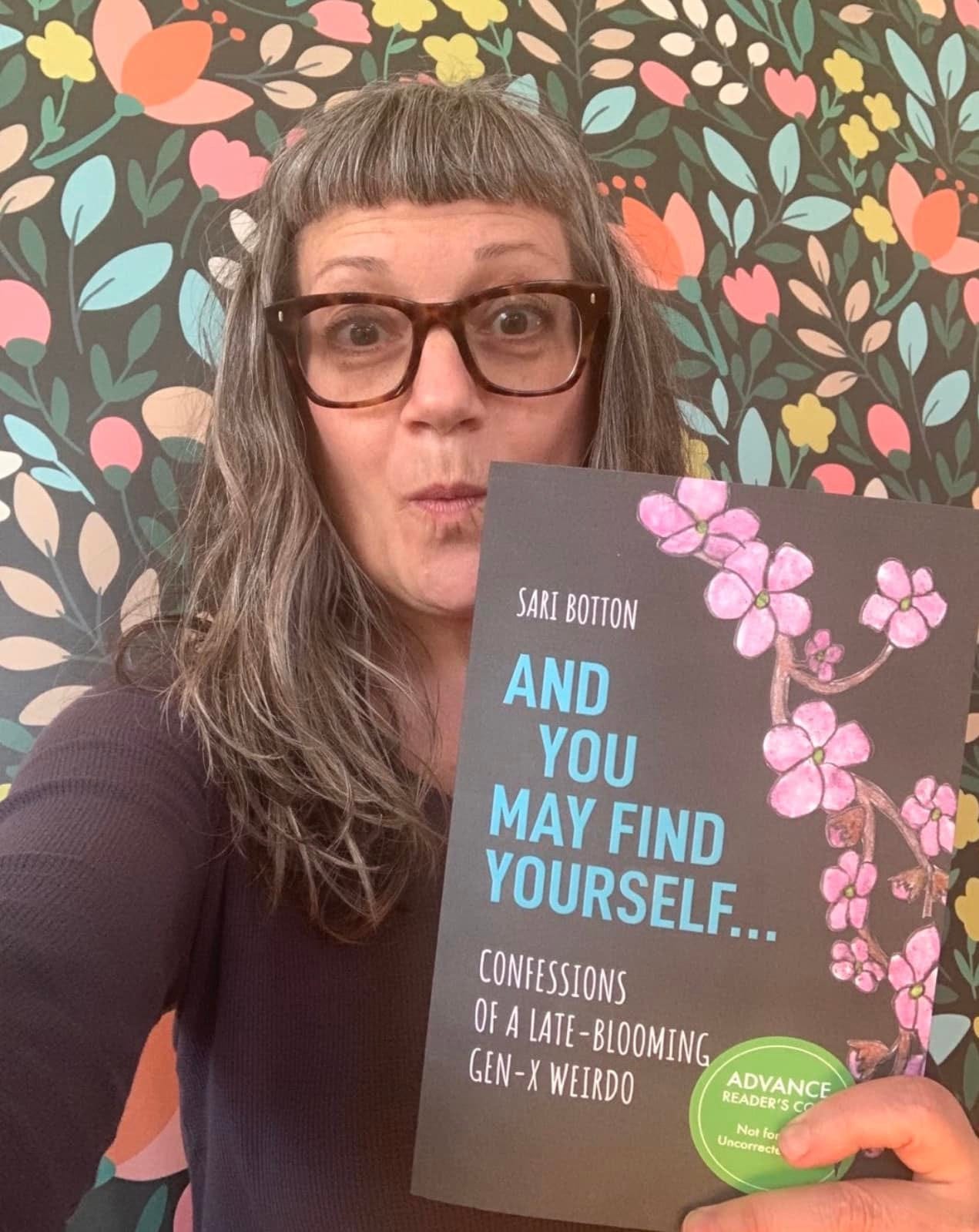Unsplash Photo Credit: Holly Mandarich
I became acquainted with Sari Botton through the writer ecosystem Substack. We’ve never met in person nor talked by phone. But I find myself intrigued by her work.
A few months hence, the unthinkable happened….she reached out to inquire about featuring me in her Substack publication called Oldster.
And just like that, BOOM!
Now it’s time to flip the tables and talk about Sari’s book “And You May Find Yourself,” which has been described as a soul-stirring journey, a luminescent tapestry woven from the threads of late-found selfhood. From a glance at the Amazon reviews, Sari’s book could best be described as a beacon for those who have wandered through the labyrinth of life, seeking purpose amidst the echoes of self-doubt and the clamor of pleasing others.
Botton, with her incandescent Gen-X spark, unravels the shrouds of her own self-suppression, chronicling a pilgrimage towards feminism and self-actualization that arrives with the grace of time.
Reviewers laud her work as a testament to the feminine spirit's resilience. "In her edgy, tender, witty way," one person says, "Sari Botton has crafted an odyssey for every woman who has ever twisted herself into shapes to meet the world's demands."
Through Botton's battles, defeats, and triumphs, her narrative sings a hymn of hope: It is never too late for rebirth, for as long as the heart beats, the journey continues.
Kingston, NY, is where Botton, a writer, editor, and esteemed teacher, spins her stories. Her voice has graced The New York Times and myriad other platforms. As the mastermind behind the acclaimed anthology "Goodbye to All That" and its New York Times bestselling sequel, along with her history as Essays Editor at Longreads, Botton stands as a scribe of the human condition, a chronicler of the city that never sleeps, and an unyielding advocate for the power of self-discovery.
A little about your life journey and what inspired you to write this collection of humorous essays? Were there specific life experiences or moments that sparked the idea?
Sari: There have been so many occasions in my life where I heard David Byrne in my head singing, "And you may find yourself...living in a shotgun shack..." except it wasn't a shotgun shack, it was where ever I had landed in life that I didn't really belong, because I'd been trying to please other people, or be who I thought they wanted me to be.
The place I heard that refrain the loudest was in the waiting room of a fertility clinic in my early 40s. What was I doing there? Why was I putting myself and my husband through that challenge, when deep in my bones, I knew I didn't want to have children? Well, the answer is that I had once again pursued something that the culture told me I should want, even if I didn't want it.
That became the through line for this book of essays. I wouldn't say they're all humorous, although I do have a tendency to approach tragedy through the lens of absurdity, which infuses even the more poignant pieces with a bit of humor.
Can you share your process of selecting and organizing the essays in the book? How did you decide on the order in which they appear?
Sari: About one-third of the essays are updated versions of pieces that were published before. The other two-thirds I wrote just for the book. I wrote a long, ugly, unpublishable draft first, getting out of my body and mind all the nasty things I'd never want to say publicly. After that I took a little break, then went to work revising and refining, over several subsequent drafts.
Part of that process was deciding which pieces did and didn't belong in the book. Several landed on the cutting room floor. I'll use them elsewhere. They just weren't perfect fits for the particular lens of this collection. As for the order, I chose to present them along three themes, and within that, over a general chronological arc.
Humor can be a powerful tool for addressing serious topics. Can you discuss how humor plays a role in tackling deeper themes or reflections in your essays?
Sari: My favorite essays to both read and write are ones in which difficult experiences are approached through a lens of absurdity. Because the most tragic things we experience as human beings can make us feel as if we've landed on a strange planet governed by different laws of nature.
I remember when I was at my grandfather's funeral, and the rabbi started describing him as this fun-loving man who adored children. I'm sorry, but my grandfather was a gruff man who yelled mercilessly at kids. I started laughing uncontrollably. I thought, What a weird tradition it is to falsely valorize people just because they passed away. To me, those kinds of absurdities around tragedy are incredibly fascinating, and worth writing about.
Were there any particular authors or essayists who have influenced your writing style or approach to this book?
Sari: The two books that have most influenced me as a writer are Fierce Attachments by Vivian Gornick, and Traveling Mercies: Some Thoughts on Faith by Anne Lamott. I learned from Gornick how to lovingly portray even those with whom we have the most difficult relationships. I learned from Lamott how to write about regrettable choices with an ample dose of self-love and humor.
Could you share a memorable or challenging moment during the writing of one of the essays? How did you overcome it?
Sari: The essay I found most challenging to write and polish was the one about a relationship I had with a man who was deep in the throes of alcoholism. It was hard to write from a few angles: 1) Getting to a place where I wasn't writing out of anger. 2) Scrutinizing myself and my choices—to be in that relationship, to stay in it after I already had certain information—in a cold, hard, honest way. 3) Re-re-re-editing the piece so that I not only achieved 1) and 2) , but also so that I blurred that person sufficiently.
I wanted to make him so unidentifiable, only he would know it was him. When one of my best friends said to me, "I don't remember you ever dating a painter," I knew I'd achieved the perfect degree of identity blurring. Because she knew the person in question and didn't recognize him. (I have never dated a painter.)
Your essays often touch on personal experiences. How do you balance the fine line between sharing personal anecdotes and maintaining a sense of privacy?
Sari: I work very hard to make sure I'm comfortable with how much I'm revealing about myself and others. It's central to my work, especially since earlier on in my career, I published details that upset others who appeared in my work, and also published details about myself that might have been better kept to myself.
I've interviewed many other memoirists about how they've handled it, and that helped inform my current approach: I blur others' identities to the best of my ability, and I refine and refine the piece until it's less about me and a specific person, and more about a relatable phenomenon I'm trying to name.
Many readers enjoy essays that resonate with their own lives. Are there any essays in the book that you’ve found have particularly resonated with your audience of readers? Any idea as to why?
Sari: The two that readers most often tell me they saw themselves in are "Mean Girls," about being ostracized by a clique in junior high, but then finding that kind of thing reappearing in my life, and "Hurricane Tim," about somewhat unconsciously inventing an outdoorsy version of myself that I thought would appeal to a handsome, rugged jerk.
I thought it would be the only woman who related to those, but I've heard from both men and women that those two people are very resonant. I think they touch on very common themes. My 83-year-old mom recently had one of those mean girls moments—junior high never ends! And how many of us have tried to be who we thought another person wanted us to be?
Humor can vary greatly from person to person. How do you navigate the challenge of making sure your humor connects with a diverse readership?
Sari: I don't think about it that way at all. I'm more inclined to think that if it tickles me, it will tickle others. Not everyone will love it, but listening to my own instincts about what's funny, or what's moving, has always worked best for me. There's a genuineness that results from that approach, and that genuineness is what most appeals to people's humanity.
Reflective essays often prompt readers to think about their own lives and experiences. What kind of reactions or reflections do you hope the essays in your book will evoke in your readers?
Sari: I read memoirs and essays for the identification they can offer. It's very life-affirming to know that you're not alone in your experiences and your emotions. I hope to offer that to my readers, and I know I have.
Many have reached out to tell me that I told the story they'd been struggling to share, or a point of view they'd struggled to clearly identify. One woman told me that "Hurricane Tim" helped her understand how inauthentic she'd been in her marriage, and how that led her to end it, which was the right choice for her. That email meant so much to me.
Can you tell us about any future projects or themes you're considering for your next book?
Sari: I've started working on some new essays, which I hope to eventually collect in another book. I don't yet know what lens I'll share them through, but I have a feeling it will have to do with getting older, the theme of my magazine, Oldster.
You're Invited to Join Our Literary Journey!
Welcome to "Great Books, Great Minds," where my passion for books takes center stage. This endeavor is more than a project; it's a labor of love that's driven by countless hours of research and writing. It's my way of contributing to a world filled with community, connection, and meaningful conversations, all nurtured by the power of literature.
If you've found this digital newsletter to be a source of inspiration and insight, if you relish the opportunity to explore exceptional books alongside remarkable authors and fellow book enthusiasts, then I'd like to extend a special invitation to you.
Join our community as a valued supporting member with a subscription at just $6.00 per month or $60.00 per year. Your support fuels our literary journey and ensures that we can continue to bring you these enriching experiences.








Thanks for interviewing me, Diamond-Michael.
Love this! Sari is so authentic and inspirational (I just groaned to myself while using both of those words, but they’re true!!)
I can’t wait to pick up her essay collection - I love that David Byrne song, and the sentiments it expresses.